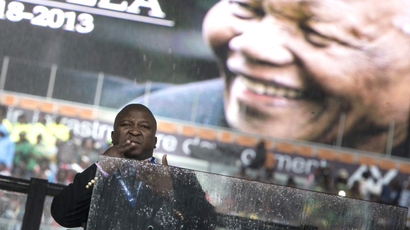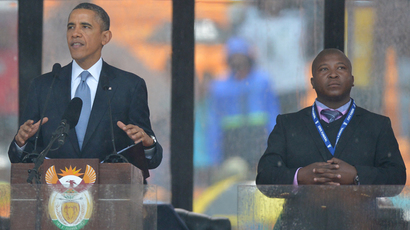Crime and corruption rife in South Africa ahead of May elections
“People here seek a better life through crime,” a police officer in Alexandra township – a former center of anti-apartheid activism – told RT. As South Africa celebrates 20 years of democracy, corruption and poverty continue to trouble the country.
Crime is rampant in the township of Alexandra, some 12 kilometers northeast of Johannesburg, where the headquarters of the African National Congress once stood. Out of the quarter of a million inhabitants of the area, around 60 percent are unemployed and living below the poverty line.
RT’s Paula Slier visited one of Johannesburg’s most notorious areas where the police struggle to maintain law and order.
Local police constable Barabo Molete told Paula Slier that the situation is “frightening” for the inhabitants, but they are trying to “make the best effort.”
“There is a large majority of poverty, as you can see, so a lot of people here seek for a better life or better way of living through crime,” said Molete. He added the police in South Africa are underpaid and more often than not it is up to the individual to obtain the necessary training for the job.
However, the statistics suggest that Molete and his colleagues may be fighting a losing battle. According to data gathered by Transparency International in 2013, South Africa is one of the 36 countries where the police are seen as the most corrupt institution, with over 80 percent of the population believing law enforcement to be corrupt.
Moreover, according to a report by the BBC in 2010 there are around 18,000 murders each year and another 18,000 attempted murders.
After the death of the country’s late former president, Nelson Mandela, who died in December aged 95, the record of the country’s current president, Jacob Zuma, has come under scrutiny in the run-up to presidential elections in May. Zuma, who has sought to identify his rule with that of Mandela’s, will address the nation Thursday in what is expected to be a speech concentrating on the year’s achievements ahead of the elections. On Tuesday, political rival and MP for the Democratic Alliance party, Lindiwe Mazibuko, launched a heated attack on Zuma’s African National Congress party, under the banner “five more years of Zuma is five more years of corruption and unemployment.”
Mazibuko claimed Zuma’s government had failed in the fight against corruption, citing figures from the Special Investigating Unit that R675 billion ($68.8 billion) had been lost in corruption since 1994.
Asked about whether crime and poverty will be reduced in the future, Molete, the beat policeman, said: “We can only hope. Poverty still stays within the heart of the people.”
For more watch Paula Slier's report.














